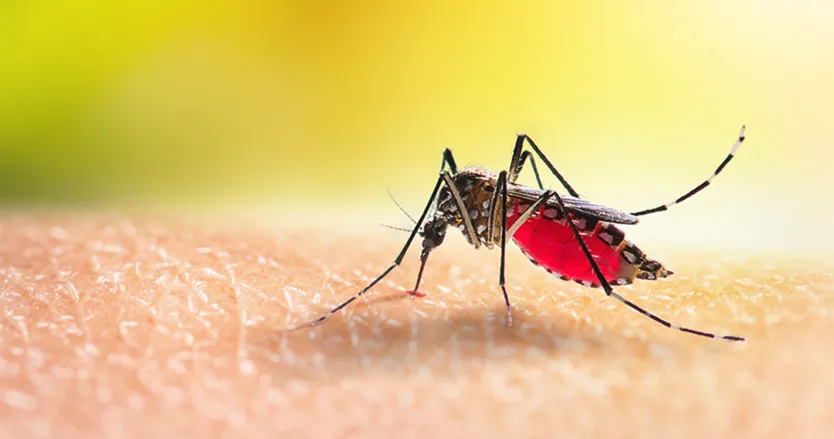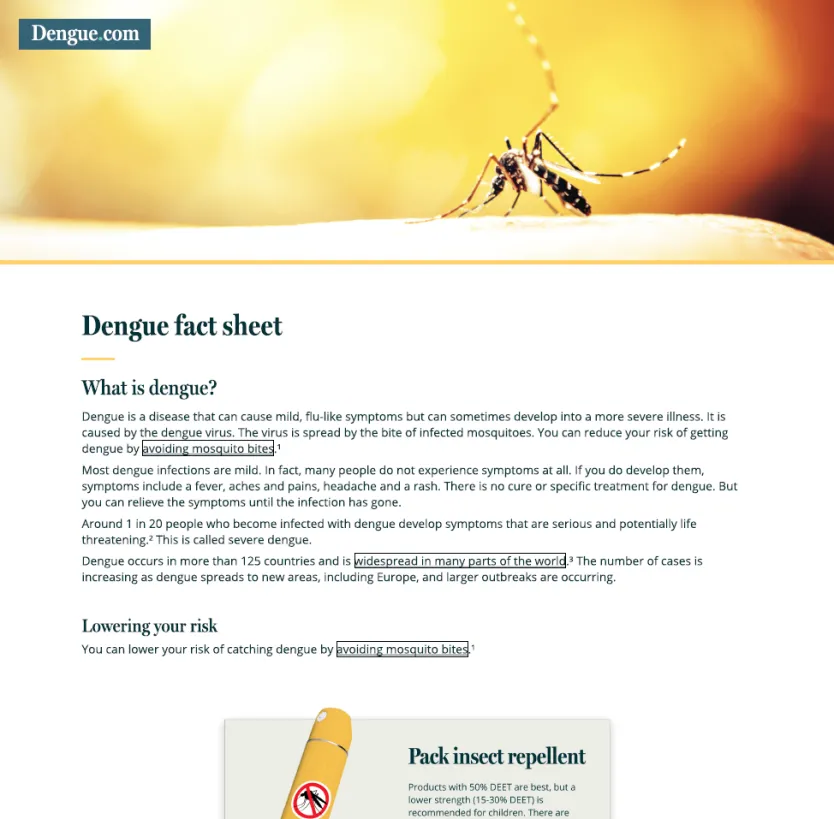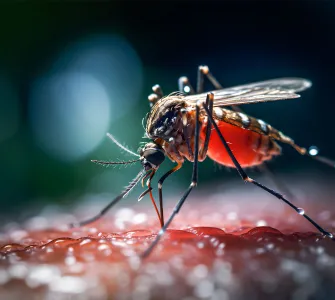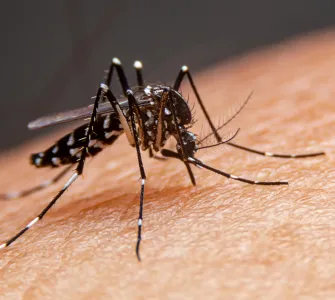8 myths about dengue debunked: Setting the facts straight

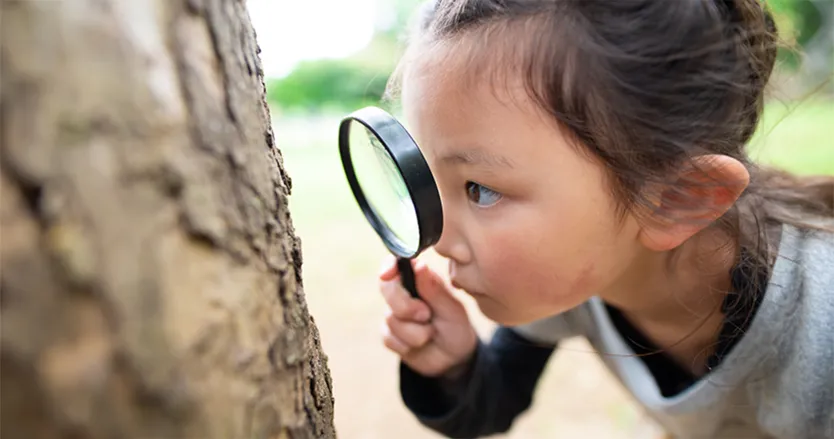
8 myths about dengue debunked: Setting the facts straight
Dengue is a growing threat and was identified as one of the World Health Organization’s top ten global public health concerns in 2019.1 Although many dengue infections are mild (1 in 4 are symptomatic), there are two major reasons that make dengue a global challenge.2-4 The first is the speed at which it is spreading – dengue is one of the fastest spreading mosquito-transmitted viral diseases in the world, with an estimated 390 million people infected annually.1,5 The second is the seriousness of its complications; severe dengue can develop in about 5% of symptomatic patients – it can result in leaky and damaged blood vessels, causing severe bleeding and sometimes, death.1,3,6,7 The spread of dengue has been rampant and common false beliefs exist among communities about this disease.2,3,8 In fact, new myths pop up all the time, let’s look at some of the common ones out there…8,9
Myth #1: I have been bitten by a mosquito, it must be dengue
Fact: Some people worry about being infected with dengue whenever they are bitten by a mosquito.8 However, most mosquitos do not actually carry disease.10 Also, for the mosquitos that do carry disease, dengue is just one of the many infections they can spread.11 Other infections spread by mosquitos include malaria, chikungunya and yellow fever.11 So a mosquito bite (if it leads to disease at all) can result in many other infections besides dengue.11
Dengue is transmitted by the Aedes species of mosquito but only if the mosquito itself is infected with this disease.2 There are ways to tell this mosquito species and its bites apart from others.8 Aedes mosquitos have a distinct black and white stripes on their body.12,13 They prefer to bite in the daytime and can leave a redder and itchier bite than others.8 Unfortunately, these mosquitos prefer biting humans to animals and when they do bite it tends to be around the elbows and knees.8,12
Aside from Aedes mosquitoes, dengue can also, rarely, be transmitted by blood transfusions and organ transplants.14
Myth #2: I have already had dengue so I am immune to it
Fact: This is not true. A recent dengue infection may stop you from getting infected again for the next two or three months, but this protection fades in the long-term.15,16 There are actually four strains of the dengue virus. This means that having dengue only protects you against one of these four types (specifically, the one that infected you) and you can become ill with dengue a second time if you are infected with a different strain.16 What’s more, while most dengue infections are mild, a second infection with a different strain to the first is more likely to be severe than the original infection.2,15,16
Even if you have had it before, it’s important to continue taking measures to help protect yourself from dengue.
Myth #3: I don’t live near swamps or sewers, so dengue-carrying mosquitoes won’t be near me
Fact: Unlike some other mosquito species that thrive in swamps and marshes, dengue carrying Aedes mosquitoes prefer to breed in clean, stagnant water.13 Instead of swamps, they lay their eggs (which can be up to a hundred at a time) in man-made containers such as bottles, cans and discarded tires.17,18 These habitats are likely to be found near humans.12
Aedes mosquitoes can lay eggs in tiny puddles of water the size of a coin.8
A big part of fighting dengue is successfully eliminating potential breeding sites of Aedes mosquitoes. This requires the active participation of families and communities in environmental clean-up efforts.18
Myth #4: Dengue is contagious and can be spread to my family by direct contact
Fact: Incorrect – dengue is not contagious, and it cannot be spread directly from person to person.8 However, there is still a way dengue could be spread to your family, although not through direct contact. If an already infected person is bitten by a second mosquito, this mosquito could in turn, become infected too. If it then goes on to bite another person, they could also become infected.8 In that way, you could act as a ‘reservoir’ for the dengue virus and you could still pass it on to your family (although not through direct contact with them but through a mosquito instead).8
Myth #5: Remedies like papaya leaf juice, goat milk, crab soup and giloy can cure dengue
Fact: In some dengue endemic countries people use remedies such as papaya leaf juice/extract, goat milk, crab soup and giloy to treat dengue.19,20 The lack of available anti-viral drugs and vaccines against dengue infections may be one reason why people turn to traditional practices and home remedies.20 There is however, no scientific evidence to back these remedies for the treatment of dengue.19 Looking at papaya leaf juice, one way this myth may have originated involves a substance in your blood that helps with clotting, called a platelet. During a dengue infection, the number of platelets in your blood can drop dramatically. As a result, patients with a low platelet count are at a higher risk of internal bleeding, which can be one of the signs of severe dengue.8 While the juice of papaya leaves has indeed been shown to help restore platelet count – just like with the other remedies, there is no scientific evidence to back it as a treatment for dengue.8
There is currently no cure for dengue. Though, there are important preventative measures, medications for symptom relief as well as vaccines.2 You can speak to your doctor to find out more.
Myth #6: I can control dengue-carrying mosquito populations by using insecticides
Fact: One study found that most people in Madeira believed that insect repellents or flyswatters were effective in controlling mosquito populations. But this is incorrect.9 While these practices can help avoid mosquito bites, they can’t effectively slow down or control the growth of mosquito populations.9 This myth is particularly unhelpful as it may mean people focus on these methods to control mosquito populations instead of more effective methods such as removing breeding sites.9 Actually, previous studies in Madeira suggest that Aedes mosquitos are resistant to the most common insecticides.9
Myth #7: I cannot get dengue because I am a strong and healthy young adult
Fact: This is a dangerous misconception. It is true that dengue can be more severe in some groups, such as children or people with certain conditions like diabetes.21 This is partly due to a weaker or compromised immune system in these groups.21,22 However, dengue can affect people of any age.5
No matter who you are, it is important that you take appropriate precautions if you are in an area where dengue is a risk. It is a good idea to speak with your doctor if you are travelling to a dengue endemic country even if you consider yourself fit and healthy.
Protective measures against dengue include using insect repellents, wearing long-sleeved clothes, and using mosquito-nets when sleeping.2
Myth #8: My fever from dengue has subsided so I am not longer at risk
Fact: If you have been infected with dengue, you may think that the worst is over once the fever has gone. This is indeed true for most people: The majority of people with dengue have mild or no symptoms and will get better in 1–2 weeks.2 However, around 1 in 20 people can progress to severe dengue.21 This happens after the initial fever has gone away and symptoms can include bleeding in the gums, nose or in the stools.2 Severe dengue is a life-threatening medical emergency that needs prompt treatment.6
Don’t be lulled into a false sense of security when fever from dengue subsides as it could still develop into severe dengue (though this is thankfully, rare).2
Keep in mind that myths about dengue can be dangerous
We have now examined some of the common myths surrounding dengue but be aware that there are many more circulating. It is important to ensure you have accurate information about dengue so you can make the right choices to help protect yourself and your family. If it develops, severe dengue requires immediate medical attention and treatment.23 We examine severe dengue and its associated risks in more detail in the Severity section of this site.
Always get your information about dengue from a trusted source. See your healthcare provider for reliable information on dengue including the latest preventative and treatment measures.
References
World Health Organization. Available at: https://www.who.int/news-room/spotlight/ten-threats-to-global-health-in-2019 Accessed December 2023.
World Health Organization. Available at: https://www.who.int/news-room/fact-sheets/detail/dengue-and-severe-dengue Accessed December 2023.
Phillips ML. Environ Health Perspect. 2008;116(9):A382-8.
Centers for Disease Control and Prevention. Available at: https://www.cdc.gov/dengue/hcp/clinical-signs Accessed December 2023.
Schaefer Available at: https://www.ncbi.nlm.nih.gov/books/NBK430732/. Accessed December 2023
Mayo Clinic. Available at: https://www.mayoclinic.org/diseases-conditions/dengue-fever/symptoms-causes/syc-20353078 Accessed December 2023.
COCA NOW. Available at: https://emergency.cdc.gov/newsletters/coca/083022.htm. Accessed December 2023.
Zaheer S, et al. Ann Med Surg (Lond). 2022;81:104535.
Nazareth T, et al. PLoS Negl Trop Dis. 2015;9(3):e0003395.
Centers for Disease Control and Prevention. Available at: https://www.cdc.gov/mosquitoes/communication-resources/press-kit-mosquitoes.html Accessed December 2023.
World Health Organization. Available at: https://www.who.int/news-room/fact-sheets/detail/vector-borne-diseases. Accessed December 2023.
CDC_aegypti_factsheet. Available at: https://health.hawaii.gov/docd/files/2015/11/CDC_aegypti_factsheet.pdf. Accessed December 2023.
National Environmental Agency. Available at: https://www.nea.gov.sg/dengue-zika/prevent-aedes-mosquito-breeding. Accessed December 2023.
Centers for Disease Control and Prevention. Available at: https://www.cdc.gov/dengue/transmission/index.html. Accessed December 2023.
CDC Yellow Book 2024. Available at: https://wwwnc.cdc.gov/travel/yellowbook/2024/infections-diseases/dengue. Accessed December 2023.
Nature education. Available at: https://www.nature.com/scitable/topicpage/host-response-to-the-dengue-virus-22402106/ Accessed December 2023.
Masters SW, et al. Lab Animal Sci Prof. 2020;55(6):42-45.
Pan American Health Organization (PAHO). Available at: https://www.paho.org/en/news/29-4-2016-communities-urged-clean-mosquito-breeding-sites-prevent-zika-during-vaccination-week Accessed December 2023.
Jain S, Sharma SK. Indian J Med Res. 2017;145(6):718-721.
Ismail IS, et al. Malays J Med Sci. 2019;26(3):90-101.
UNICEF. Available at: https://www.unicef.org/rosa/stories/dengue-how-keep-children-safe. Accessed December 2023.
Rowe EK, et al. PLoS Negl Trop Dis. 2014;8(4):e2777.
Mallhi TH, et al. BMJ Open. 2017;7(7):e016805.


















